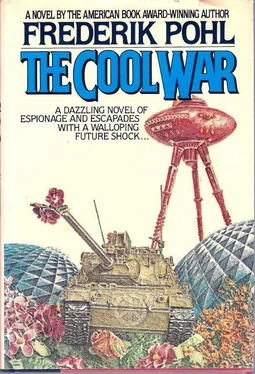Her expression became opaque. “That much I don’t trust you, Hake.” And then she added, “Actually, there’s not much I can do. I’m blown, for here and now. I’ll move to another place. There are others who will stay and carry on—” She hesitated, glanced at her watch, and then said more rapidly, “And that’s what I wanted to see you for. Will you join up?”
“Join what?”
“Join on the side of the good guys! What the hell do you think? You can make up for a lot of crumminess if you’ve got the nerve to take a stand now.”
Hake brought his open palm down flat on the water, splashing the girl and startling her. He said furiously, “God damn it, Leota! How do I know your stupid games are any better than theirs? This whole situation is sick.”
“Then don’t make it sicker! Come on, Hake. I don’t expect you to fall into my arms now. I just want you to think about it. I’ve got to go, but I’ll give you time. Overnight. I’ll call you at your hotel tomorrow morning. Early. I’m sure they’re bugging your wire, so I won’t say anything. You speak. Just say hello. Say it once for yes, twice for no—three times for maybe. Which,” she added irritably, “is about what I’d expect from you. Then I’ll get in touch, never mind how. And, Hake. Don’t try setting any traps or anything. I’m not alone, and the other people on my side right now play rougher than I do.”
She picked up her face mask, but paused before putting it on. “Unless you’d care to say yes right now?” she inquired.
He didn’t answer, because there was a sound like a tiny rapid-fire cap pistol from the mouth of the cave. They both turned. The little hydrogen-powered outboard came bouncing through the opening and then arrowed straight toward them, looking as if it were suspended in blue space.
Hake grabbed an oar. He didn’t know the two men coming toward them, but it was a good bet that they worked for Yosper. “Get out of here, Leota!” he cried. “I’ll see if I can keep them busy—”
But she was shaking her head. “Oh, Hake,” she said sorrowfully, “no, they’re not yours. They’re a lot worse than that.”
Hake held the oar before him like a quarter-staff, but it was apparent that it would not be much use. The two men
were not very big, and certainly not formidably dressed. Like Leota, they wore i minimi. But unlike Leota, they carried guns. The one at the motor had a pistol, the other what looked like a rapid-fire carbine, pointed directly at Hake. It was now obvious that they were the two who had been lounging on the ledge outside; more than that, they had a somewhat familiar look—like someone he had seen somewhere before, and a lot like each other.
“Put your oar down, Horny,” Leota said. “I didn’t mean for this to happen, at all.”
The two men did not only resemble each other, they were almost identical. They had to be twins: tiny dark bodies, no more than five feet three, long straight black hair, neat short beards, black eyes. From under the tarpaulins Hake could see them sitting in the bucket seats on either side of the chattering outboard, Leota draped across the coaming on one side of them. Two well-to-do Eastern gentlemen enjoying the Mediterranean with a pretty girl: there was nothing in that spectacle to attract anyone’s attention. He could hear the first of the party boats arriving with its tandem flywheels whining away, but one of the men had his foot on Hake’s neck. “Easy, cock,” he said, grinning conventionally. “Don’t try to sit up. You’d just get all those nice people killed.”
“Do what they say, Horny,” said Leota. Hake didn’t answer. With a foot on his windpipe he couldn’t. And what was there to say?
They bounced over the gentle swell for twenty minutes or more. Then the machine-gun sound of the motor slowed, one of the men wrapped a cloth around Hake’s eyes, he was kicked in the small of the back, the tarps were dragged off him and he was prodded up a rope ladder. “Stay on deck, sweetie,” said one of the men in his high, accentless voice—to Leota, Hake assumed. Then one on each side of him they shoved him through a door and down a steep companionway. He heard a door close behind them, and one of the men said: “You can take the blindfold off now. And sit down.”
Hake unwrapped the rag from his face and blinked at them. He was in a low-ceilinged room, bunk beds at either end and a padded locker along the wall, under a porthole covered with a locked metal hatch. There was barely room for all three of them at once. He sat on the locker less because he had been told to than because it was the best way he had of establishing distance between them. But one of them pulled camp chairs from under a bunk, and they drew them up one on each side, facing him.
Then he remembered where he had seen them, or one of them, before. “Munich! When I was sick. I thought you were a doctor.”
“Yes, Hake, that was me. I am Subirama Reddi,” said the one on the left, “and this is my brother Rama. You can tell which is which because I am left-handed and my brother right. We find this useful. Also Rama has a scar over his eye, do you see? He got that from an American in Papeete, and it makes him mean.”
“Oh, no, not mean!” said Rama, shaking his head. “We will get along very well, Hake, provided that you do exactly as we say. Otherwise—” He shrugged, with an expression that was somewhere between a smile and a pout. They spoke perfect English, colloquial and quick if sometimes odd. It was not quite true that they had no accents. The accents were there, but they were not identifiable. To Hake, they sounded vaguely British, but he thought that to a Brit they would have seemed American—as though they had come from somewhere along the mid-Atlantic ridge, or perhaps from Yale. Their voices were as high and pure as lead tenors in a boy’s choir, though what they said was not childish. “What you must do,” Rama Reddi went on, “is to tell us completely and quickly all of the names of the agents you have worked with, and what you know of the operations of your agency.”.
This was not going to be a pleasant time, Hake realized. And it was all foolish, because he knew so little! He turned to Rama and began, “There isn’t much I can tell—” The next word was jolted out of his mouth as Subirama’s fist hit his ear. Hake turned toward him in rage, and Rama’s fist clubbed him on the other side. It was now clear why their opposing handedness was useful.
Subirama moved his chair back a few inches, and switched the gun he had been holding in his free hand to his good one. He spoke rapidly to his brother, who nodded and produced a rope. While Rama Reddi was tying Hake’s hands, Subirama said, “You Americans are very confident of your size and strength. I do not, actually, think you could prevail against either one of us in bare-hand combat, much less two. But I think that you might attempt something which would make it necessary for us to kill you. So we will remove temptation.” He waited until his brother had finished with Hake’s hands, and then drove his fist into Hake’s stomach. “Now,” he said conversationally, “we will start ‘with the names of the persons you have contacted in Italy so far.”
Before they were through Hake had told them everything they asked for. He did not try to resist, after the first few minutes. As long as they confined themselves to beating him he might survive, and even recover; but they made it clear that if he held out it would cost him his fingernails, his eyes and his life, in that order. He gave them names he didn’t know he remembered. All four of Yosper’s helpers. Every member of his class Under the Wire. He even gave a physical description of the woman who had led him to his first interview at Lo-Wate Bottling Co. and the sheep-herder who had driven him to the airport bus. He could not tell which parts interested them. When some name or event led them to demand more information, he did not see why. Why would they care about a Hilo avocado-grower’s wife? But they questioned him endlessly about Beth Hwa. He told them what he knew, everything he knew, some of it four and five times. Then they let him rest. Hake didn’t think they were being considerate. He thought their fists were sore.
Читать дальше












